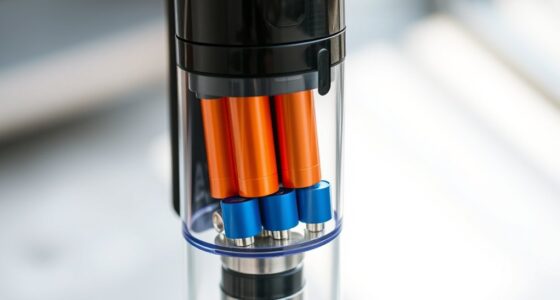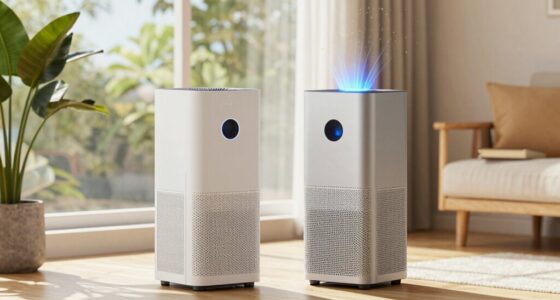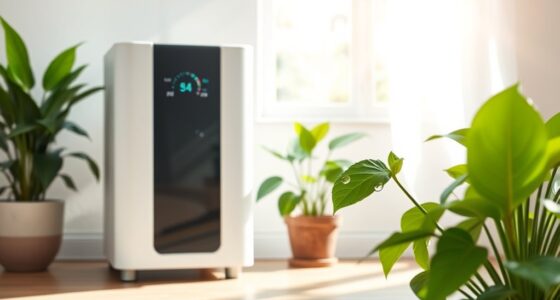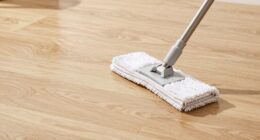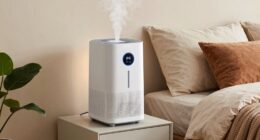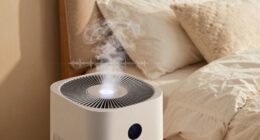Air purifiers can greatly benefit you if you have COPD. They filter out harmful airborne particles like dust and smoke, which helps reduce respiratory symptoms. Using a HEPA air purifier can improve air quality and ease breathing, minimizing issues like cough and breathlessness. Regular use can also enhance lung function and overall well-being. If you’re curious about how to choose the right model and maintain ideal air quality at home, there’s more to discover.
Key Takeaways
- HEPA filters in air purifiers capture 99.97% of airborne pollutants, significantly reducing respiratory symptoms for COPD patients.
- Cleaner air helps alleviate breathlessness and coughing, promoting easier breathing for individuals with COPD.
- Regular use of air purifiers can enhance cardiovascular health, improving heart rate variability in COPD patients by 25%.
- Maintaining optimal air quality is essential for lung function and overall well-being in individuals with COPD.
- Air purifiers with activated carbon filters eliminate odors and gaseous pollutants, further improving indoor air quality for COPD sufferers.
What Is an Air Purifier?
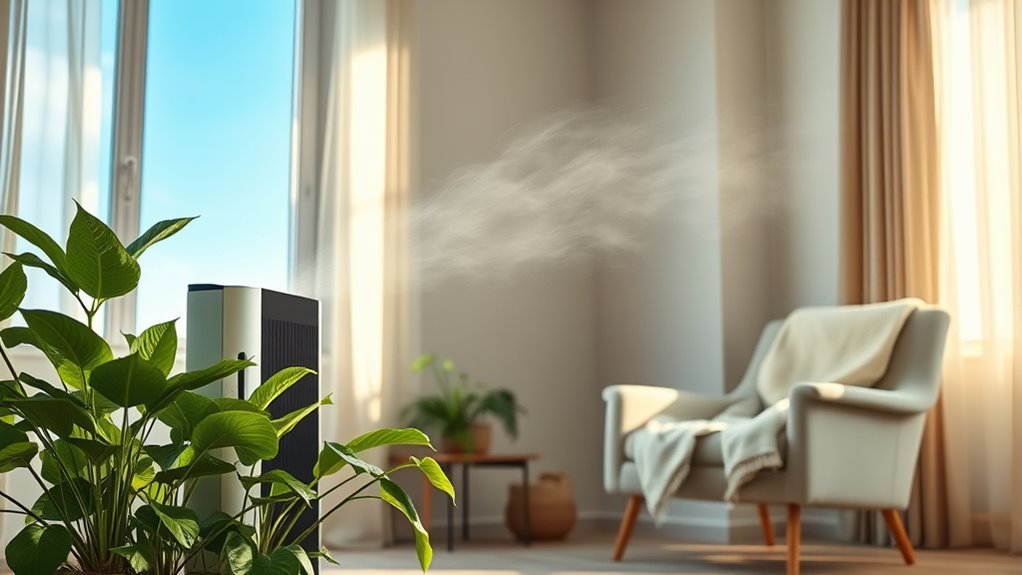
Air purifiers are essential devices designed to enhance your indoor air quality by filtering out harmful airborne particles. These electronic devices use various technologies, including HEPA filters, which effectively trap 99.97% of particles as small as 0.3 microns. This makes them especially beneficial for those with respiratory conditions like COPD. Additionally, many advanced models may incorporate UV light technology, which enhances air quality by killing bacteria and viruses.
By regularly using an air purifier, you can greatly reduce indoor air pollution, which is often two to five times worse than outdoor levels. Many air purifiers are portable, allowing you to easily move them between rooms, while others can integrate into your central heating and cooling systems. Additionally, some models feature activated carbon filters, which help eliminate odors and gaseous pollutants, further improving your indoor environment. Regular use of air purifiers can lead to improved respiratory health and alleviate symptoms for individuals with conditions such as COPD. Furthermore, utilizing units with multi-functionality can provide a comprehensive approach to maintaining a healthier living space. It is also important to regularly check and clean filters to ensure optimal performance and efficiency of the air purifier. Moreover, effective filtration can significantly reduce allergens in your environment, benefiting those with COPD even further.
How Do Air Purifiers Help With COPD?

How can air purifiers make a difference for those living with COPD? Air purifiers equipped with HEPA filters can eliminate over 99% of airborne pollutants, like dust and smoke, which can exacerbate your respiratory symptoms.
By reducing indoor air pollution, these devices can greatly decrease issues like breathlessness and coughing, helping you breathe easier. Studies indicate that regular use of air purifiers can improve your cardiovascular health, showing a 25% increase in heart rate variability among COPD patients. Additionally, using decongestants and antihistamines may further alleviate respiratory distress caused by allergies. Furthermore, maintaining proper air quality is essential for overall health, as it helps create an environment conducive to better respiratory function. The effectiveness of air purifiers aligns with the principles of energy-efficient systems, which emphasize reducing energy consumption while enhancing indoor environments. In addition, beekeepers often emphasize the importance of sustainable practices to promote healthier ecosystems, which can indirectly benefit respiratory health through improved air quality.
Cleaner air may enhance your lung function and overall well-being, making it easier to manage obstructive pulmonary disease. Investing in an air purifier is a proactive step toward improving your quality of life and managing COPD effectively. Furthermore, many models, such as the Winix 5500-2 Air Purifier, incorporate advanced technologies that neutralize odors and allergens, providing an even healthier environment.
Types of Air Purifiers
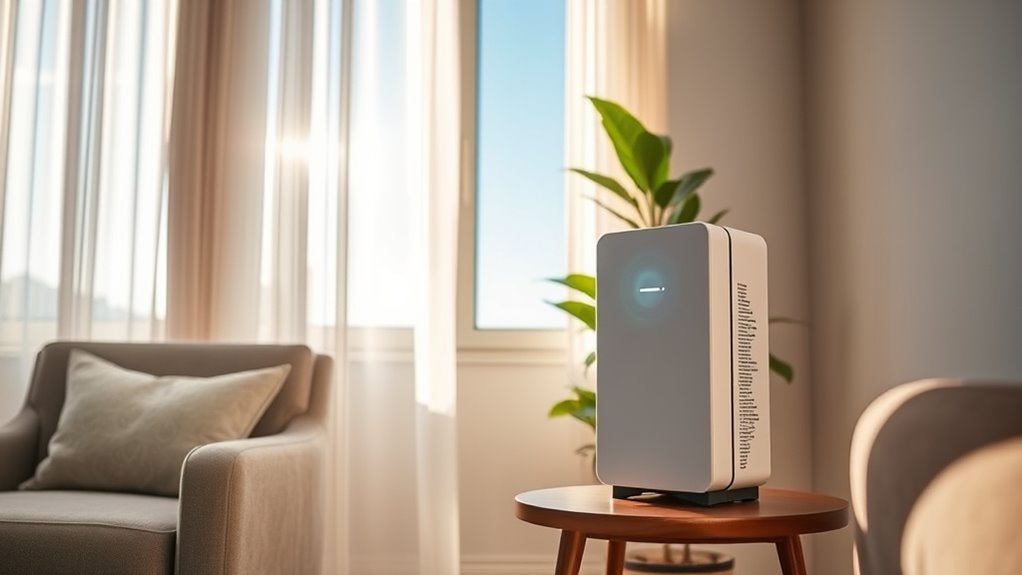
Here are three common types:
- HEPA Purifiers: These are highly effective, capturing 99.97% of particles as small as 0.3 microns, making them ideal for filtering indoor air pollutants that can affect your respiratory health. Additionally, using essential oils such as eucalyptus oil can complement the effects of HEPA filters by providing decongestant benefits. Regular filter cleaning ensures that HEPA purifiers maintain their efficiency over time, and their ability to reduce allergens significantly benefits those with respiratory issues. Furthermore, vibrational alignment with a healthy environment can enhance overall well-being and support better lung function.
- Activated Carbon Filters: While they won’t capture fine particulate matter, these filters effectively trap odors and volatile organic compounds, enhancing overall air quality. Incorporating activated carbon filters into your air purification system can significantly improve the removal of unwanted smells and harmful gases, thereby contributing to a healthier living environment.
- Electric Air Cleaners: They use charged plates to trap particles but can produce ozone, which may worsen respiratory conditions. For individuals with COPD, avoiding such devices is crucial to prevent exacerbation of symptoms and maintain lung health.
Avoid ozone generators, as they can exacerbate COPD symptoms and increase infection risks. Regular maintenance of your air purifier, including filter replacements, is crucial to ensure it operates effectively and continues to improve your indoor air quality.
Choose wisely to protect your lung health.
Choosing the Right Air Purifier

When selecting an air purifier for COPD, prioritize models with HEPA filters, as they capture 99.97% of particles as small as 0.3 microns, reducing allergens and pollutants effectively. Additionally, efficient energy use enhances the overall performance of air purifiers, making them more cost-effective in the long run. It’s also beneficial to consider that proper sealing mechanisms in air purifiers can help enhance filtration efficiency and maintain cleaner air quality.
Consider the room size to guarantee the purifier covers the entire area. If you plan to use it in a bedroom, evaluate the noise level—quieter models can improve your sleep quality. Furthermore, be aware that state tax implications can affect your budget for purchasing such devices, especially if you are relying on IRA withdrawals for funding.
Look for additional features, like activated carbon filters, which help eliminate odors and gases, enhancing your overall air quality. Heat pumps, for instance, utilize renewable energy sources, contributing to both energy efficiency and lower operational costs.
Don’t forget about maintenance; regular filter replacements are crucial, as HEPA filters usually need changing every 6 months to 1 year to maintain peak performance. Additionally, effective ventilation is important in reducing indoor air pollutants and improving air quality for individuals with respiratory issues.
Maintaining Air Quality at Home

Maintaining excellent air quality at home is essential for anyone with COPD, as indoor pollutants can be considerably higher than those outside.
Maintaining excellent indoor air quality is crucial for individuals with COPD, as indoor pollutants often exceed outdoor levels.
To create a healthier environment, focus on these key practices:
1. Use air purifiers** with HEPA filters** to capture over 99% of airborne allergens, greatly reducing respiratory symptoms.
2. Implement regular cleaning practices**** like vacuuming and dusting to minimize indoor pollutants.
Don’t forget to change air conditioner filters every three months to maintain efficient air filtration.
3. Ensure proper ventilation by closing windows on high pollen days to keep outdoor allergens at bay, thereby enhancing your indoor air quality. Additionally, consider integrating smart home devices to monitor and improve air quality in real-time.
Frequently Asked Questions
Do Air Purifiers Help COPD Patients?
Yes, air purifiers can help you greatly by improving your indoor air quality.
They remove harmful pollutants and allergens, which can ease your respiratory symptoms. With HEPA filters capturing tiny particles, you’ll breathe cleaner air, reducing issues like coughing and breathlessness.
Regular use can also enhance your overall well-being. If you’re concerned about air quality, investing in an air purifier might be a smart choice for your health.
Do Air Purifiers Help With Respiratory Problems?
Yes, air purifiers can help with respiratory problems. They work by filtering out harmful particles like dust, allergens, and smoke from the air, which can improve your indoor air quality.
When you use an air purifier, you’re reducing your exposure to these irritants, making it easier for you to breathe. Regular use can lead to fewer respiratory issues and a more comfortable living environment, especially if you’re sensitive to airborne pollutants.
How Do Air Purification Systems Make Air Healthier for People to Breathe?
You’ve probably heard the saying, “Clean air is a breath of fresh air.”
Air purification systems make the air healthier by filtering out harmful particles like dust, pollen, and smoke. They capture over 99% of these airborne pollutants, reducing indoor allergens and irritants.
Activated carbon filters also tackle unpleasant odors and harmful gases.
With cleaner air, you can inhale more freely and enjoy a more comfortable indoor environment, ultimately enhancing your overall well-being.
Which Is Better for COPD Air Purifier or Humidifier?
When deciding between an air purifier and a humidifier, you’ll find that air purifiers are generally the better choice.
They actively filter out harmful pollutants and allergens from the air, making it cleaner and safer to breathe.
Humidifiers, on the other hand, only add moisture and can sometimes worsen air quality if not maintained.
For your respiratory health, especially in polluted environments, an air purifier’s benefits far outweigh those of a humidifier.
Conclusion
To sum up, air purifiers can greatly improve your quality of life if you have COPD by reducing harmful particles in the air. While some theories suggest that air purifiers may not eliminate all allergens, studies indicate they can effectively lower irritants like dust and smoke. By choosing the right purifier and maintaining it regularly, you can create a healthier home environment. Remember, fresh air can make a real difference in managing your condition and enhancing your well-being.


